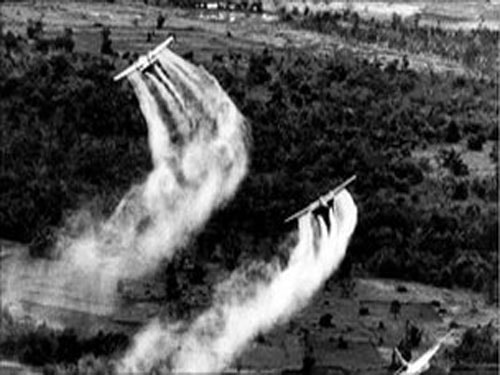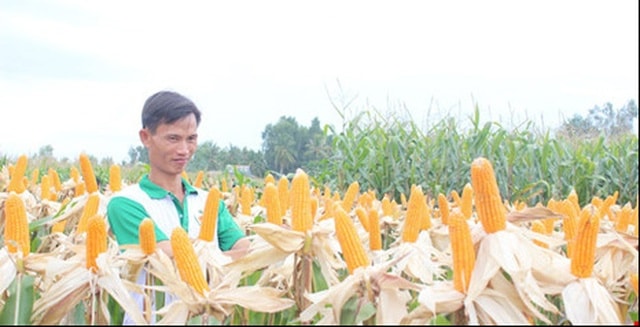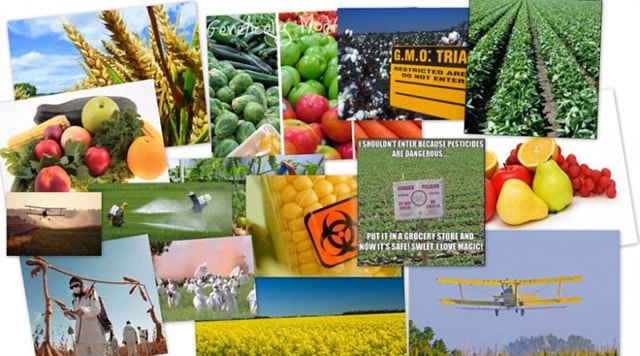What has Monsanto been doing in Vietnam?
(Baonghean.vn) - Monsanto - one of the main suppliers of herbicides and Agent Orange used by the US military during the Vietnam War - officially returned to Vietnam in 2010. Up to now, this Group is currently providing genetically modified seeds and herbicides to Vietnamese farmers.
1. Agent Orange in the Vietnam War
On April 18, the International Monsanto Tribunal released a recommendation for consultation on allegations of human rights violations and ecological destruction by Monsanto Corporation (headquartered in St. Louis, Missouri, USA). In particular, it considered Monsanto’s involvement in Agent Orange used by the US military during the Vietnam War and suspected ecological destruction.
 |
| The US sprayed tens of thousands of tons of dioxin on Vietnam during the war. |
Monsanto was one of the main suppliers of herbicides and Agent Orange used by the US military during the Vietnam War. It is estimated that during the period 1962-1973, approximately 75.8 million liters of herbicides were sprayed by the US military on nearly 2.6 million hectares of land in Vietnam, of which Monsanto was the main supplier. This type of poison caused serious health problems for the Vietnamese people as well as harming American soldiers and other countries.
Monsanto is the key company among 37 chemical companies that Vietnamese Agent Orange victims sued in the US (from 2004-2009) to demand compensation for damages.
2. Return to Vietnam and genetically modified seeds
In Vietnam, Monsanto has been present since 1995 as a representative office of Monsanto Thailand. In August 2010, Monsanto officially established a branch in Vietnam, named Dekalb Vietnam Co., Ltd. Dekalb Vietnam trades in corn and vegetable seeds and focuses on biotechnology products.
Then in October 2014, after more than 40 years, Monsanto made a rather loud comeback in the Vietnamese media by dedicating 1.5 billion VND to award scholarships to the Vietnam National Academy of Agriculture in the fields of breeding and biotechnology.
Just one month later, the Ministry of Natural Resources and Environment granted Biosafety Certificates for two genetically modified corn varieties with herbicide tolerance to Dekalb Vietnam Co., Ltd. (Monsanto Group) and Syngenta Vietnam Co., Ltd. A total of three genetically modified corn varieties of the two companies were granted Biosafety Certificates.
 |
| Corn is the first genetically modified crop to be commercialized in Vietnam. Currently, farmers in some localities have planted genetically modified corn such as Dong Nai, Ba Ria-Vung Tau.... |
Previously, the Ministry of Agriculture and Rural Development also recognized four genetically modified corn varieties from Syngenta and Dekalb as eligible for use as food and animal feed. At that time, the process of bringing genetically modified crops to Vietnamese fields was basically completed.
Less than a year later, Monsanto was licensed to grow three varieties of genetically modified corn for animal feed in Vietnam. Together with Syngenta Vietnam, the Ministry of Agriculture and Rural Development also granted certification to DeKalb Company (a subsidiary of Monsanto USA) to mass-sell genetically modified corn in Vietnam.
In the world, there are 11 large corporations and companies in genetically modified crops with a total of 329 varieties, Monsanto and Syngenta alone account for nearly half. If we count the joint ventures and associations of Monsanto and Syngenta, the number is much larger.
Vietnam has officially commercialized genetically modified crops (GMOs) with the mass planting of genetically modified corn, which is resistant to pests, since 2015 and it is expected that by 2020, the area planted with genetically modified crops will account for 30-50%. Currently, Vietnam is also importing millions of tons of corn and soybeans as raw materials for livestock production, most of which are genetically modified foods.
3.Sale of herbicides and genetically modified products
At the end of 2015, Dekalb Vietnam Company held a launching ceremony to introduce agricultural products applying genetically modified technology in Hanoi. At the launching ceremony, 2 new product lines of Dekalb Vietnam, Dekalb Genuity corn variety and Maxer herbicide, were widely introduced.
Dekalb Vietnam has chosen a domestic partner, HAI Agricultural Pharmaceutical Company, as the official distributor of the herbicide Maxer 660SC.
In a workshop held in early March, a Monsanto representative affirmed that "Dekalb Vietnam has always accompanied farmers for the past 20 years" and said that Monsanto has invested more than 1 million USD "in research activities to develop varieties suitable for climate and farming conditions in Vietnam, helping farmers improve productivity".
 |
| Genetically modified foods (GMO) are flooding Vietnam, we use them every day without knowing it. |
"At the same time, in 2015, Monsanto officially transferred to Vietnamese farmers one of the technologies that helps farmers protect productivity, thereby contributing to reducing food loss during cultivation - corn technology resistant to insects and herbicides," a Monsanto representative affirmed.
In fact, there are always two opposing opinions on genetically modified crops and foods. Those who support them constantly assert that this type of food is safe, helps increase crop productivity and does not harm the environment. Meanwhile, those who oppose it fear that it will have unwanted effects on consumers’ health and cause economic losses.
Returning to the case of Vietnam, with the newly issued decision, Vietnam is now the 29th country to grow genetically modified crops. However, like India, experts say there are concerns about farmers’ dependence on seed sources monopolized by multinational corporations.
Peace
(Synthetic)
| RELATED NEWS |
|---|
